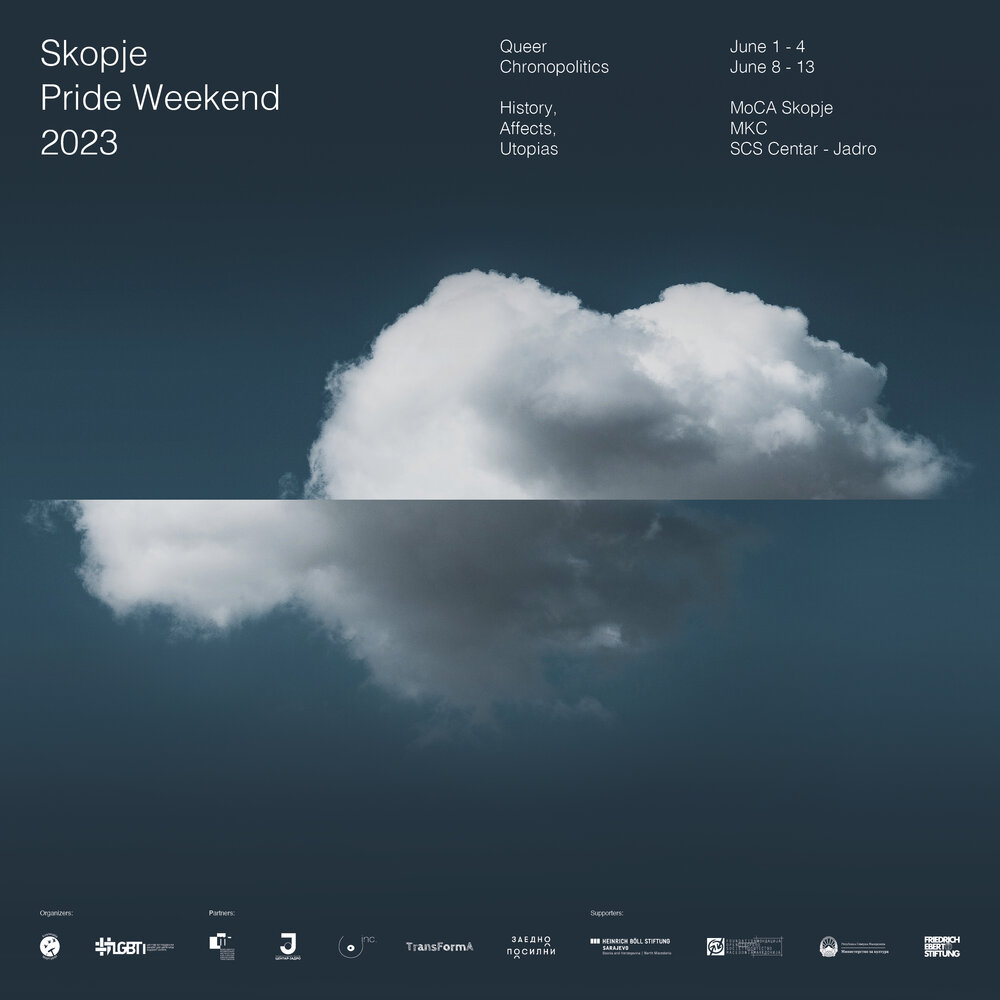The thematic focus of SPW 2023 is QUEER CHRONOPOLITICS: History, Affects, Utopias. This year's curatorial choice of festival theme draws on complex and multifaceted research, critique and performance within queer and feminist art, theory and culture that question, problematise and rethink heteronormative, nationalist, capitalist and racial assumptions and politics of time, history and the archive, both in collective and individual normative assumptions about time, history, memory and development.
A particular focus of the festival is the questioning of hegemonic nationalist historiographical narratives and policies of national archives, as well as their strategies of erasure, exclusion and ignoring of the invisible and secret histories of sexual and gender minorities and their experiences, on the one hand, as well as the possibilities of revision, rereading, rewriting and reimagining the historical (absent) traces and voices, and ephemeral archives of queer people, on the other.
Additionally, with this theme we aim to critically explore the disciplinary and regulatory mechanisms that mobilize temporality as a key technology and vector of power in the reproduction of heteronormativity, capitalism and racist/colonial violence, inscribing itself as second nature to individual and group bodily experiences, while simultaneously they distinguish and hierarchize progressive versus backward and primitive bodies and subjectivities, i.e. normal temporal forms of personality development from backward and sexually "regressive" forms of life and sexuality.
The problems that this year's festival edition will address start from the multitude of queer theories and historiographies that place the question of time and history at the center of their investigations. Beginning with the "father" of modern queer theory, Michel Foucault, and his genealogical explorations of the history of sexuality, the deconstruction and analysis of power relations in the construction of various, seemingly stable and trans-historical objects and phenomena, including gender and sexuality, become an exciting subject for queer theory, art and culture, and an opportunity for political critique and activism, as well as imagining different futures and mobilizing utopian desires from beyond the prison of the normative present. On the other hand, Foucault's research related to the discipline and regulation of bodies in modern and contemporary societies introduced rhythm, temporality, temporal dynamics, and the biopolitical regulation of reproduction as key problems for critique through queer optics, opening intersectional investigations of heteronormativity, capitalism, racism and nationalism as exclusively productive methods in the thinking of temporal politics of discipline and regulation.
Along these lines, feminist, queer, and trans studies of temporality argue that European normative time is organized to foster a deeply gendered dichotomized heteronormativity, and that women and sexual minorities often experience time differently. Consequently, the ways in which the state controls the life trajectories of individuals and groups with normative assumptions about the linear and necessary order of birth, schooling and labor force, marriage, reproduction, retirement, old age and death are subject to critical analysis. Or how everyday life is disciplined by the gender organization of home time and working time. Other researchers, on the other hand, criticize the model of development that underpins Western models of history and psyche. Analyses of resistance to normative temporal patterns include, but are not limited to, explorations of the Freudian unconscious, profound disruptions of life expectancy and generational logic during the AIDS crisis, the temporal modalities of queer 'nightlife', the disjunctive pubertal time of gender transition , and much more. Some of the key terms from time studies in the context of gender/sexuality include: Edelman's (2004) 'repro-futurism', or the idea that the future is organized by the symbol of the child and the future as the reproductive horizon of the existing dominant hetero-logic; Roman (2005) with "archival drag" or the concept of performance as embodied memory; Luciano (2007) with "chronobiopolitics", or a model of sexual organization of life through time; Muñoz (2009) with the concept of the "not yet present", or the aspirational queer utopian desire and horizons of the future; "erotohistoriography" (Freeman, 2010), or the model of historical inquiry and practice as directly sensual; and the "transhistoricity" of trans experience past, present, and future, and about the impact of imperialism, racism, and other structural inequalities of gender.
Finally, queer research on the politics of time focuses on the affective dynamics and socially organized experiences of melancholia, depression, mourning, mourning, abjectivity, etc., as lived experiences that reject the progressive idea of forward-looking time as a capitalist hetero-chrono-normativity of productivity, and by turning back to the past they remember the histories of violence, the collective experiences of loss of marginal communities, but at the same time they rework, redefine and revalue the lived past experiences of injury and shame.
Affective turning back, in fact, for queer people, is also a sensual, desirous, and yearning search for, digging through, and imagining one's history and lines of belonging through the ruins of grand national histories. Through the flashes, traces and ephemera of shadow lives, and forbidden experiences at the edges of history. As Elizabeth Freeman (2005) argues, queer people “survive through the ability to find and seize relations of pleasure between bodies. And we do that throughout time" and through history.
The SPW 2023 was held in the period from 01.06 - 10.06. 2023, in Skopje, and the following events were included in the program:
- Retrospective exhibition of the Polish visual artist Karol Radziszewski - "Queer archives and queer chronopolitics", at MoCA.
- Performance by Shirley Harthey Ubilla (Sweden) – "Abject of Desire";
- Public lecture by Marina Gržinič (Slovenia) – "Punk, Queer and Yugoslavia;
- Performance by Malik Nashad Sharpe (marikiscrycrycry) (UK) – “Goner”;
- Solo exhibition of the young Macedonian artist Jovan Josifovski;
- Dance performance by the trio STEAM ROOM (MKD/BUG/SPN), the last choreographic work from their "DragOn" trilogy;
- Night of Queer Storytelling – Shame on You!


